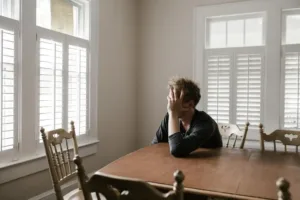When you think of depression you might think of a person crying or looking sad. Signs of depression in men can show up as irritability, fatigue, or even physical pain rather than overwhelming sadness. Have you ever felt like you’re constantly on edge, burned out, or just can’t seem to enjoy life like you used to? Male depression is often overlooked or misunderstood, but it’s more common than you might think—and it’s treatable. Discover the signs of depression in men, break the stigma, and prioritize mental health. Depression can be treated once it’s recognized.
Male depression is under-diagnosed
Many mental health professionals are not trained to identify symptoms of depression in men, leading to under-diagnosis. There is often a misconception regarding male vs female depression statistics, with many believing women have higher rates of depression. However, when gender-sensitive assessments are used, men and women have similar rates of depression. Depression in men is important to understand because men have higher rates of death by suicide. Male patients may display externalizing symptoms like anger, substance use, or risky behavior, which can be misinterpreted or ignored, further complicating the diagnosis process. Undiagnosed depression can have serious consequences. It’s crucial to understand that male depression can manifest differently from traditional signs of sadness or low mood commonly associated with depression.
Understanding the symptoms of depression in men can help you or someone you care about seek help before the condition worsens. Below, we explore ten key warning signs of male depression, along with real-life examples to illustrate how these symptoms may appear in everyday life.
10 Signs Of Male depression
1. Lower stress threshold or more stressed out than usual
Men experiencing depression often display increased irritability or anger rather than sadness. Frequent frustration, short tempers, and emotional outbursts can be indicators of deeper struggles. This shift in temperament can stem from unresolved stress, suppressed emotions, or hormonal imbalances. Unlike women, who are more likely to express their depression through sadness and tearfulness, men may externalize their emotions as anger, making their struggles less obvious.
2. Risk-Taking and Impulsivity
Engaging in risky behaviors might seem thrilling or adventurous, but for some men, it can be a subtle expression of emotional distress. Studies show that men experiencing depression are more likely to engage in activities such as reckless driving, gambling, or substance abuse as a way to distract themselves from painful emotions or regain a fleeting sense of control. A 2015 study published in the Archives of Sexual Behavior found a significant link between depressive symptoms and impulsive sexual behavior in men, suggesting that this pattern often stems from emotional turmoil rather than a desire for excitement. These actions are rarely recognized as symptoms of depression, which can lead to feelings of shame or confusion, both for the individual and those close to them.
Men suffering from depression may engage in reckless behavior to escape emotional pain. This could include sex, gambling excessively, driving dangerously, or using drugs and alcohol. Such behaviors often stem from impulsivity, a lack of self-worth, or self-destructive tendencies. While women with depression are less likely to engage in high-risk behaviors, men often turn to dangerous activities rather than expressing their emotions.
3. Feeling of being burned out and empty.
Men experiencing feelings of burnout and emptiness may exhibit various physical symptoms such as fatigue, insomnia, or changes in appetite. Men can feel like they “just dont have anything left in the tank.” Burnout can feel like a lack of motivation or not having agency. Burnout is a common sign of depression in men over 40 as they are often deeply engaged in their profession.
The experience of being overwhelmed by these feelings can impact mental health significantly, leading to conditions like depression or anxiety. Men must recognize these signs and consider seeking help from a therapist or mental health professional.
4. Increased aggression, irritability, and/or anger
Many men experiencing depression may exhibit increased aggression, irritability, or anger as primary symptoms. For example, a man who was once calm and collected might suddenly become aggressive at work or frequently argue with family members. “Many of the men we work with tell us stories of road rage or losing their getting into an argument at their son’s ball game. This can have negative impacts on everyone involved” explains Stephen Rodgers, LCSW, Therapist at Denver Men’s Therapy. Anger in male depression often serves as a defense mechanism, masking deeper emotional distress.
5. Difficulty concentrating
Men experiencing depression often struggle with difficulty concentrating, impacting their daily functioning. For example, it might take twice as long to complete the work project due to being easily distracted. “It’s common to see guys who are depressed spend hours on social media as a distraction from life,” says Rodgers. To address this, incorporating strategies like putting the phone away, practicing mindfulness techniques or setting small, achievable goals can help improve focus and attention.
6. Constant, inexplicable tiredness.
Depression can cause persistent fatigue, even after a full night’s sleep. A man might find it difficult to get out of bed in the morning and feel exhausted throughout the day, no matter how much rest he gets. This constant fatigue may be due to sleep disturbances, nutritional deficiencies, or underlying anxiety. While women often report feeling drained, they may still maintain their social interactions, whereas men are more likely to isolate themselves and disengage from responsibilities.
7. Difficulty making ordinary everyday decisions.
Men experiencing depression often struggle with making even simple daily decisions. For example, it might be hard to decide what to eat for dinner. The constant negative thoughts and feelings associated with depression can cloud their thinking process, leading to indecisiveness and hesitation. This difficulty in decision-making can manifest in various aspects of life, from choosing what to eat for a meal to making important career choices.
Seeking therapy can provide valuable support in improving decision-making skills by addressing underlying issues contributing to indecisiveness. Therapists can help individuals develop coping strategies, enhance self-awareness, and challenge negative thought patterns that hinder decision-making abilities. Engaging in therapies like EMDR therapy, ketamine assisted psychotherapy or mindfulness practices has shown promising results in helping men navigate through decision-making challenges.
8. Especially in the morning, having a feeling of anxiety or uneasiness.
Men experiencing depression often feel anxious and uneasy, particularly in the mornings. This can be attributed to the negative thoughts and deep sadness that dominate their minds upon waking up. The weight of these emotions can make the start of the day challenging, impacting their ability to function optimally.
- Feelings of anxiety and unease may stem from unresolved issues or stressful life events.
- Such emotions can manifest as physical symptoms, affecting sleep patterns and overall well-being.
- Addressing these early morning struggles is crucial to prevent them from escalating throughout the day.
9. Sleep problems: sleeping too much, too little, difficulty falling asleep, waking up early.
Male depression often manifests through various sleep disturbances. For example, it may be difficult to fall asleep, wake in the middle of the night, or wake up early and can’t go back to sleep. When this becomes chronic just the thought of bedtime can cause stress and anxiety. Sleep problems can harm our mental health.
Tips for improving sleep quality include maintaining a consistent sleep schedule, avoiding screens an hour before bedtime, creating a relaxing bedtime routine, avoiding stimulants before bed, and ensuring a comfortable sleep environment.
10. Using alcohol and pills in order to achieve a calm relaxing effect.
Alcohol and drug use can become a way for men to self-medicate their depression. A man who only drank occasionally may start relying on alcohol nightly to relax or numb his emotions. This behavior often arises from a need to escape emotional distress, peer pressure, or genetic predisposition. “Alcohol and drugs are like throwing gas on a fire. They will make your depression symptoms worse” says Stephen Rodgers, LCSW. While women may turn to emotional expression or food for comfort, men are more likely to resort to substances.
These 10 signs of male depression were adopted from the Gotland Male Depression Scale.
These 10 signs of male depression were adopted from the Gotland Male Depression Scale.
Male depression and suicide
One of the most serious symptoms of depression in men is thoughts of self-harm and suicide. A man might frequently express that “nothing matters” or believe that “the world would be better without him.” These thoughts can be triggered by chronic stress, deep despair, job loss, or end of a marriage, or a perceived lack of support. Statistics from the CDC show that men die by suicide at a rate nearly four times higher than women. The societal pressure for men to appear strong and self-reliant can make them less likely to seek help, increasing their risk. Unlike women, who are more likely to vocalize their distress and seek support, men often suppress their emotions, leading to impulsive and fatal decisions. Early intervention is crucial in preventing tragic outcomes, and seeking professional help can make a significant difference.
Depression Treatment For Men
Encourage male patients to engage in talk therapy to address negative thoughts and stressful life events contributing to their depression. This form of therapy can help them process emotions and develop healthier coping mechanisms.
EMDR therapy and Ketamine-assisted therapy offer unique benefits in alleviating depression symptoms in men. EMDR helps individuals reprocess traumatic memories, while Ketamine has shown rapid antidepressant effects, especially beneficial for treatment-resistant depression.
Collaborate with male patients to create a personalized treatment plan, incorporating a trial of different activities, exercises, or therapies. Providing mental and emotional stimulation through such interventions can significantly aid in coping with challenging life events and managing physical symptoms associated with depression.
Male-Specific Depression: What to Watch For
Some forms of depression uniquely affect men, such as male postpartum depression symptoms, which can develop after the birth of a child due to stress, sleep deprivation, and hormonal shifts. Additionally, depression can become more pronounced with age, and recognizing signs of depression in men over 40 is essential for long-term well-being.
When to Seek Help for Male Depression
If these male depression symptoms resonate with you or someone in your life, seeking depression counseling is the next step. Therapy, lifestyle changes, and sometimes medication can make a significant difference.
At Denver Men’s Therapy, we specialize in supporting men through their mental health challenges. If you’re struggling with male depression and anxiety symptoms, know that help is available, and you don’t have to face it alone.
Frequently Asked Questions
What are the common signs of male depression?
Depression in men may manifest as increased aggression, irritability, difficulty concentrating, constant tiredness, sleep disturbances, and reliance on substances for relaxation. Recognizing these signs is crucial for early intervention and seeking appropriate support.
How does male depression differ from female depression?
Male depression often presents with symptoms like heightened irritability, anger, and substance use rather than traditional sadness. Understanding these distinctions can help tailor treatment approaches to address specific challenges faced by men.
Is there a link between male depression and suicide?
Yes, there is a significant link between male depression and suicide. Men experiencing depression are at a higher risk of suicide due to factors such as social stigmas around mental health, reluctance to seek help, and internalized feelings of shame or weakness.
Can depression symptoms return?
Yes. Once you experience a depressive episode you are at risk of having another depressive episode.
What psychological therapies are effective for treating male depression?
Psychological therapies such as cognitive-behavioral therapy (CBT), EMDR, and mindfulness-based approaches have shown effectiveness in treating male depression. Seeking professional help to explore these therapeutic options can provide valuable support for managing symptoms.
How can one differentiate between normal stress and male depression symptoms?
While stress is a common experience, persistent feelings of emptiness, irritability, fatigue, sleep disturbances, and substance use indicate potential male depression. Consulting a healthcare provider for a proper evaluation can help differentiate between normal stress levels and underlying depressive symptoms.

About the Author Stephen Rodgers, LCSW | Founder of Denver Men’s Therapy
Stephen Rodgers is a licensed clinical social worker and the founder of Denver Men’s Therapy, Colorado’s leading therapy practice focused exclusively on men’s mental health. With over 15 years of specialized clinical experience treating trauma, depression, anxiety, addiction, and relationship challenges, Stephen has established himself as a leading authority in male-centered therapy approaches throughout the Rocky Mountain region.
As a passionate advocate for men’s wellness, Stephen has trained clinicians across the country on EMDR (Eye Movement Desensitization and Reprocessing) and trauma-informed care. He is particularly known for helping men overcome the stigma around mental health and engage in therapy that respects their values, strengths, and goals.
Stephen is a contributor to blogs and podcasts on topics including complex PTSD, male depression, masculinity, and treatments like ketamine-assisted psychotherapy. His writing blends clinical depth with real-world relatability, making complex psychological topics accessible to men and their families.
When he’s not working with clients or developing new therapeutic programs, Stephen enjoys fly fishing, skiing, and exploring Colorado’s backcountry with his family.














